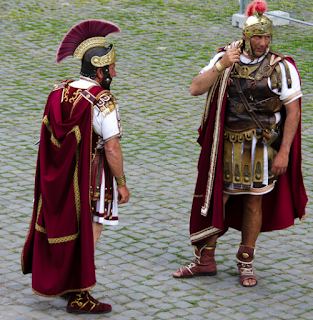The term Praetorian came from the tent of the legate of a legion in the field — the praetorium. Many Roman generals choose from the ranks a private force of soldiers to act as bodyguards of the tent. The cohors praetoria existed as bodyguards for Roman generals.
 | In 27 BC Augustus created a permanent corps of nine cohorts, each of 500 to 1,000 men. Three cohorts were kept on duty in the capital. The others were stationed in the towns surrounding Rome; no threats were possible from the individual cohorts. In 2 BC he appointed two equestrian prefects to command them. The death of Augustus in 14 AD at 75 marked the end of Praetorian calm. |
Through the machinations of their ambitious prefect, Lucius Aelius Sejanus under Tiberius, the Guard was brought into Rome itself. In 23 CE Sejanus convinced Tiberius to have the Castra Praetoria (the Camp of the Praetorians) built just outside of Rome. The entire Guard was now at the disposal of the emperors, but they were also at the mercy of the Praetorians. They gained significant political power.
 |
Folowing the death of Sejanus in 31 CE, the guards became increasingly ambitious. At will, or for the right bribe, they assassinated emperors, bullied their own prefects or turned on the people of Rome. |  |
In 41, Gaius Caligula was killed by conspirators from the guard. The Praetorians placed Claudius on the throne, daring the Senate to oppose them.
 | Praetorian Cohorts intervened many times in the struggle for the imperial succession. Lacking troops of its own, the Senate had no choice each time but to accept the choice of the Praetorians as well as that of the various legions. The new emperor was always proclaimed by the Praetorians before being ratified by the Senate and the legions stationed in the various provinces. While the guard had the power to make or break emperors, it had no formal role in government or its bureaucracy. After their acts of violence, revenge by the new ruler was almost always forthcoming. |  |
 | Although they continued to serve for about three centuries, the Guard became infamous for its interference in Roman politics. The Guard was disbanded by Constantine the Great in 312. |  |








No comments:
Post a Comment